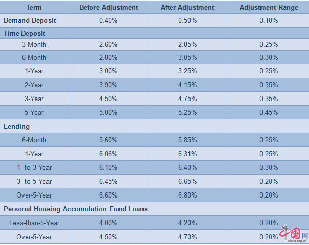Current borrowing and lending interest rates

The People's Bank of China, China's central bank, raised interest rates Tuesday for the second time since Februay this year to dampen inflation and asset bubbles. [Full coverage: Interest rates hike]
|
Current borrowing and lending interest rates |
|
|
The People's Bank of China said it would raise one-year deposit and lending rates by 25 basis points, taking the deposit rate to 3.25 percent and the lending rate to 6.31 percent. The new rates take effect from Wednesday.
The move came as the goverment is taking renewed efforts to curb rising prices in part due to the turmoil in the Middle East and the earthquake and tsunami in Japan.
|
Don't miss |
The interest rates increase, announced on the last day of the three-day Qingming Festival or Tomb Sweeping Festival, is the fourth time interest rates have risen since October.
"The major purpose of the interest rate hike is to fight inflation," Zhuang Jian, a senior economist with the Asian Development Bank, said. "Research shows that the consumer price index (CPI) for last month may reach another record high."
But he said the benchmark one-year deposit rate still lags behind the CPI.
The political unrest in the Middle East and the Japan crisis increased inflationary pressure in China, forcing the central bank to act, Zhuang added.
The CPI rose 3.3 percent year-on-year last year, exceeding the government's 3 percent target.
Consumer prices rose 4.9 percent in February, also surpassing the government target of 4 percent.
Many analysts predict that the CPI figure will increase to more than 5 percent in March.
"Our current CPI forecast is 5.2 percent year-on-year for March," said Qing Wang, an economist at Morgan Stanley in Hong Kong, in a note to clients.
"It also suggests that the Chinese authorities are confident in the sustainability of the underlying growth momentum."
Since the beginning of last year, China has raised the bank reserve requirement, the minimum reserve banks must hold back rather than lend, nine times to soak up liquidity.
Premier Wen Jiabao said at last month's annual session of the National People's Congress that inflation is a concern for most Chinese people and that reining in prices was the government's "top priority" in 2011.
Wang Yi, an analyst from China Securities Co, said the central bank needed to react to inflationary pressures, especially as the Labor Day holiday in May could see the CPI rising.
But he believes that the global economic uncertainty will see Chinese policymakers adopt a cautious approach in announcing further tightening measures.
According to a report released by the National Development and Reform Commission, price rises in food and housing were major contributors to inflation in January and February.
In the first two months of this year food prices grew by 10.6 percent year-on-year, and housing prices recorded a year-on-year growth of 6.4 percent.
In order to curb surging prices, the government has recently introduced a number of measures, including subsidizing low-income groups, increasing the food supply and adopting temporary price controls in certain industries.
Most central banks in emerging markets have raised interest rates as the regions emerged strongly from the financial crisis.
But major central banks in the developed world are now showing signs of starting to follow suit.
The European Central Bank is expected to raise interest rates on Thursday by 25 basis points to 1.25 percent after inflation rose above its target.